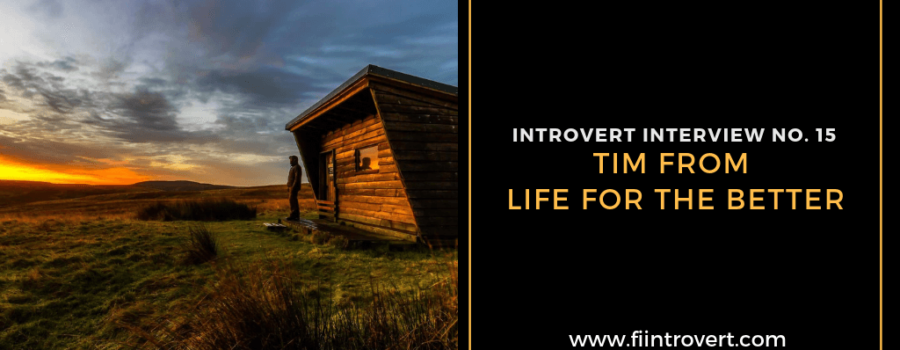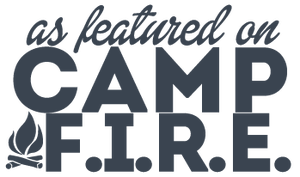
The following is an interview with Drew from FI Introvert.
This Introvert Interview series is all about knocking down stereotypes, demonstrating the potential for introverted leadership and diverse careers introverts thrive in.
Today, I am thrilled to have an introverted Air Force officer on the interview series. The military is all about loud, in your face leadership right? Surely an introvert cannot thrive. Let’s get into that plus relationships, tiny house living, and college hacks.
Tim! Welcome to the Introvert Interview Series. Tell us a bit about yourself.
My name is Tim and I’m 25 years living in the United States.
I recently got engaged! She said yes just a few weeks ago. The wedding is in six weeks!
My fiance L and I decided to create Life For The Better in part because we love the Financial Independence Retire Early (FIRE) community and what it stands for – or as I like to call it, FIOR: Financially Independent Optional Retirement. Retirement should be optional to each individual, whether they want to continue working or stop altogether. After all, personal finance is personal.
We also created Life For The Better because there is a lot of talk about money and finances but not a lot is talked about when it comes to purpose after hitting financial independence and how to live a better life all around. Whether living a better life means meditating more, living simply, embracing minimalism, doing random acts of kindness, or reading a good book (amongst many other goals), we hope to inspire you to not be so focused on money, but rather the freedom money brings.
Right on. That is a great mission for your blog. So, why do you identify as an introvert?
I identify as an INFJ on the Myers-Briggs scale. In social situations, I am constantly analyzing each conversation and body movement. This takes a toll on me and I often would like to leave earlier on. I gain the majority of my energy by being alone with my thoughts versus being with others.
Looking back as a kid I didn’t consider myself as introverted as I am now. Which to me is really interesting. I was usually the “go to” kid from sports to classes (that’s not meant to sound conceited at all). I could make friends fast and would talk to everyone from the jocks to punks to popular even the nerds. I am still that same person by adapting to any social situation and it seems that I can make friends anywhere. I believe this is due to the introvert in me listening to what individuals have to say.
I didn’t always understand introversion. I didn’t know that I needed time to myself to recharge. As I’ve grown up, I’ve learned to take extra time to take care of myself so I can take care of others once I step out the door. I came to understand introversion by learning about myself. It sounds cliche but once I learned to listen to my body and emotions did I truly understand what it meant to recharge. It’s not that introverts can’t communicate with others, it’s that introverts don’t receive as much energy from others.
Yes exactly! Speaking of others, tell us about the bracelets you and L wear.
The bracelets that L and I wear are symbols for no complaining. We have said that one shouldn’t complain because there’s so much to be thankful for. By not having complaints take over our life and find excuses for everything we take responsibility for our actions. This shifts the mindset to problem-solving.
Nice. I love that. So what tips do you have for strong communication in a relationship?
Tips for being a better communicator starts with being a better listener. Most individuals just want to say their side of the story without regards to what the other has to say. Stop and truly listen and acknowledge what the other has to say.
Also, be upfront with your partner in what sets you off or makes you happy. L and I took the Myers-Briggs test and handed one another our results. This helped us understand the other person.
Communication is the most important aspect of a successful marriage. But sometimes I don’t want to communicate. So I have to ask, what is it like living in a tiny house as an introvert?
Our tiny house is 269 sq. ft. That doesn’t leave a whole lot of room to be by myself. However, that’s the beauty! It allows me to get out of the house. I go hiking more often, go to the gym, travel more. This is how I get my alone time. If I can’t do any of these inside the tiny house I’ll go upstairs to the loft and have time to read there. I can also step outside on the “porch” and have time there.
L and I are really good at respecting one another’s time. She is highly extroverted and it comes down to communicating that I need time to myself right now. An open dialogue goes a long way.
Amazing. You get your alone time by being productive. But productivity isn’t anything new for you, is it?
Definitely not. People can’t believe when they hear how I graduated from college, earning two degrees while working full-time shift work.
To keep a long story short, I graduated high school and then went off to basic training and after that to technical school. This is where Air Force members learn about their job. I completed 69 college credits in under 7 months time.
After training, I used those credits towards my bachelor’s degree. I had to finish up a few electives in order to obtain my Associate’s degree. However, that was no big deal because I needed those credits anyways for my Bachelors. So I found a degree that would transfer these 69 credits over. This allowed me to waive one year of my bachelor’s program!
The next part of the equation was to incorporate half online and half on campus. I chose online in part because I could fit it into my schedule whenever. I also did summer school online by completing four-week classes instead of the eight weeks in the summer.
I then had to do on campus classes because they were only offered there. I’d choose classes that started at 9 am or 10 am because I got off shift at 8 am.
I’d go to class after my overnight shift and then go home and sleep. I accepted all overnight shifts at work from coworkers who had a family. This allowed me to continue going to college and they didn’t have to work overnight!
While completing these two degrees I was also being promoted at work which required additional education from the Air Force. I completed that coursework while I was at work in addition to my homework for college.
This to me was life-changing and a lot of people don’t understand how I did it. To me, it was just time-management. If I wanted to live a better life in the future, why not start now?
You got paid to go to college. What advice do you have for parents or savvy young adults reading this?
There is a saying in the military, “Don’t rush to your death.” By that, it simply means slow down and look at your options. I call this a tactical pause.
The same thing goes with talking about college. There are so many colleges out there from technical schools, to state schools, ivy league, online classes, etc. Take some time to look into the options and don’t discredit any one situation. What I personally did was a hybrid option of taking half of my classes online and the other half on campus. This provided me time away from people – hence introversion. But more importantly, time to have a job during college. There are also plenty of scholarships out there that go unclaimed each year. Look into these scholarships and take time to fill them out. The time spent filling out the scholarships will be less than paying off the student loans.
In my situation, I joined the Air National Guard. They provided me with 100% tuition as well as the G.I. Bill, which helps pay for gas, rent, groceries etc. I took the tactical pause and saw that 100% tuition plus a paycheck each month as well as the G.I. Bill as a huge benefit to working one weekend a month.
Plus this would give me a leg up in the civilian world by having military experience and showing I could hold a job and do college at the same time.
I didn’t end up being a traditional guardsman by working one weekend a month, two weeks a year. I ended up work full-time shift work, mainly the overnight shift then class during the day.
Ultimately, what I’m trying to say is look in a different direction than the traditional college student. Just by looking at options with a different angle it may help you to get paid to go to college.
So you are an officer in the Air Force. How are you an effective, introverted leader?
Being introverted, I like to keep group numbers small. This helps me interact one-on-one with individuals. I get to know each person on a deeper level which translates to helping them out in different situations. Knowing how others will act in situations or when their mood changes helps me be an effective, introverted leader by adapting to the situation.
Okay, that is fine for the day-to-day. But how do you lead in high-stress situations?
That’s a really interesting question. Most see me as cool, calm, and collected under stress. I once had an instructor tell me “I’m going to make you sweat during training. I haven’t seen one ounce of frustration from you yet.”
To me, this is because I know myself well enough to trust my instincts. When the pressure is on, there is no need to get frantic and lose control. Slow down take a deep breath and execute what you know. Stop, analyze the situation and make a call.
The military is very regimented. What strategies do you have for carving out time for yourself to recharge?
Yes, the military is very regimented. There is a purpose of every action.
Some strategies that I have for carving out time for myself is to have time management. I will focus on the task at hand, complete it to the best of my ability and use the remaining time to take a break.
I will spend 5-10 minutes creating a plan and then execute. Taking that tactical pause instead of rushing into the situation has helped tremendously.
Another strategy that I have is to delegate tasks to others. This goes back to the previous question of how I am an effective leader. By delegating smaller tasks it gives others a sense of purpose and leadership of their own. This also gives me a few extra minutes to recharge.
Great advice. Thank you for your service. How does service fit into your quest for financial independence?
I’ve always been the one to give back to others. Service helps me do just that. Financial independence is all about a journey. Most think of it just leading up to when one hits their FI number. However, I believe it’s a lifelong journey.
I would love to start a non-profit once I hit my FI number. I believe in giving back to others and that’s where service helps in my quest.
Another way service helps on the financial side of the house is a pension after 20 years of service. I can retire from the military at age 37 since I joined when I was 17 years old. I would end up receiving 50% of my base pay. That alone is huge when one considers FI numbers. I’d also receive free healthcare, which alone is a huge cost down the road.
You’ve been are amazingly driven. What are your favorite books, blogs, or podcasts that impact your life?
My favorite books are usually non-fiction. I love leadership books such as Extreme Ownership by Jocko Wilink.
I recently read Wild by Cheryl Strayed and loved every second of it. It’s about herself hiking the Pacific Coast Trail. There’s a sense of adventure and just going for it in life. Oftentimes we find ourselves making excuses. It’s really neat to me when someone just goes for it all.
My favorite blogs are the ones that challenge the way I think. Zenhabits.net is one of those. It’s about looking at one’s life and simplifying, being mindful, and being present in the moment.
My favorite podcasts are things that I’m interested in. I’ve listened to anything from sports talk shows, to travel credit cards, to leadership, even finance related. Abroaders podcast, Afford Anything, Choose FI, Countdown to FI, Mad Fientist, Fire Drill podcast, Freakonocmics, Hidden Brain, How I Built This, Impact Theory, Jocko Podcast, Mindpump, Operation Self Reset, Planet Money, Stuff They Don’t Want You to Know, Stuff You Should Know, Ted talks, BiggerPockets, The Charged Life, Joe Rogan, Tim Ferris, The Mastermind Within, The Minimalists.
You are a podcast machine! You must listen to them on like 4x speed or something. What are you working on right now?
I’m working on becoming a better person every day. How can I improve to be better than who I was yesterday? That’s a lifelong goal.
I’m most proud of myself when I travel. I love people watching and how individuals interact with one another. Watching small body movements and the way and how people say things. I then interact with these individuals. This isn’t something an introvert does all the time. However, when I travel I open up to culture and learning. That’s where I want to strive to be better.
I have a saying teach something every day and learn something every day.
I love that saying. This is been really valuable. Thanks so much, Tim. Where can my readers hear more from you?
Your readers can connect with me on my blog Life For The Better.
They can also reach me on social media on Facebook, Twitter, Instagram, Pinterest
Or email us any time at TimLifeForTheBetter LLifeForTheBetter. Both are at Gmail.
Thanks, Tim!
If you want to be interviewed for the series, contact me and tell me why you’d be a great subject! Be sure to sign-up for email updates to never miss an insightful interview.
Follow Our Journey At
We use Personal Capital to track our net worth. We simply connect our assets and it tracks everything for us! Our net worth, cash flow, budget, investment fees, retirement planner, and more are tracked through this site. It’s completely free too! Sign up for free and receive $20 when you open an account!









[…] Tim’s personality type is actually the most rare: INFJ, which stands for Introverted Intuitive Feeling and Judging. First understanding his introversion was important to me, since my results showed my primary personality trait was the opposite – an extrovert – or ENFP: Extroverted Intuition Feeling Perception. […]